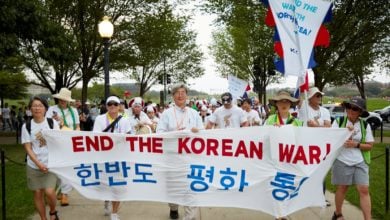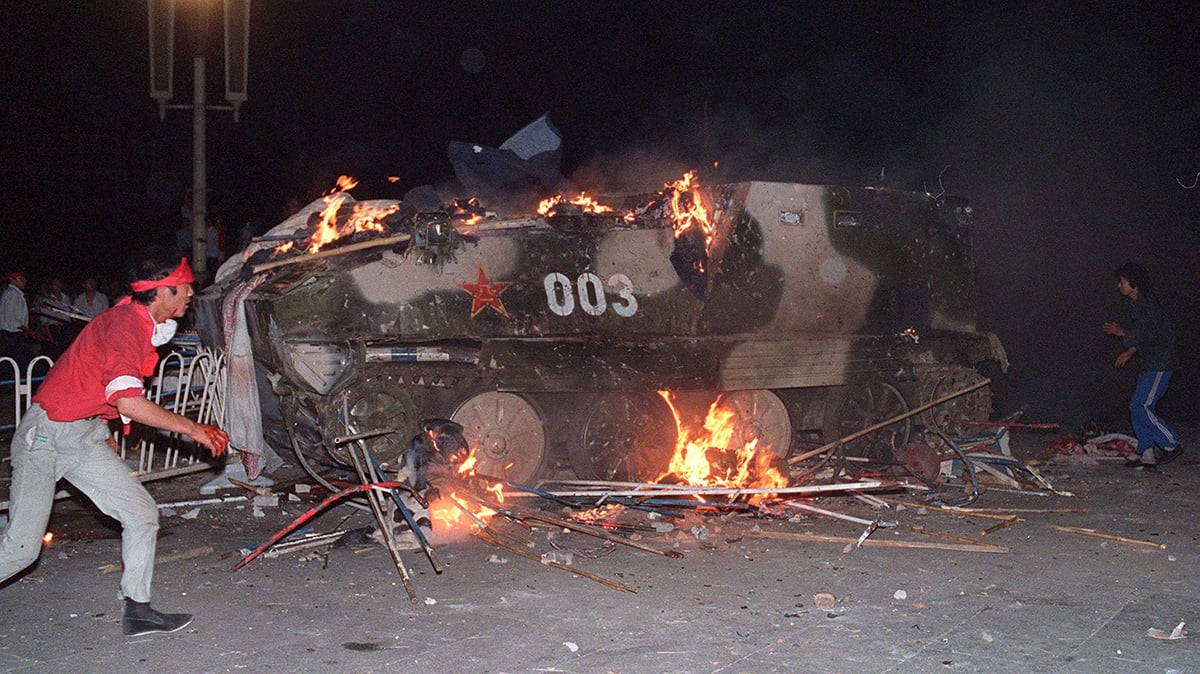On Dec. 17, North Korean leader Kim Jong Il passed away after suffering a fatal heart attack while onboard a train for a field visit. He was 69 years old. Kim has been the official head of state since 1997, following the death of his father and leader of the North Korean Revolution, Kim Il Sung, in 1994.
The Democratic People’s Republic of Korea has announced a period of national mourning, and the official funeral is set for Dec. 28. As evident from news coverage and viral Internet videos, throngs of North Koreans are pouring into the streets in united grief over Kim’s death.
Despite what is being portrayed by media as a period of political instability and uncertainty, the government of North Korea has been preparing for Kim’s death since 2008, when his health began to deteriorate following an apparent stroke. There is a well-developed succession plan for Kim’s youngest son, Kim Jong Un, who has been accompanying his father to major official meetings for the past two years.
China, which is North Korea’s strongest ally, expressed support for the transition plan last year when Kim Jong Un visited the country for a meeting. Chinese President Hu Jintao has reached out in solidarity to North Korea since the announcement of Kim Jong Il’s death. Cuba has declared a period of mourning from Dec. 20-22, during which flags will fly at half-mast.
Washington, with the help of the capitalist media, has consistently portrayed Kim Jong Il’s tenure as dictatorial and oppressive—even insinuating that the massive outpouring of sorrow over Kim Jong Il’s death is orchestrated and proof of a bizarre, brainwashed citizenry. This accusation is highly offensive. It is paternalistic, and ignores traditional mourning rituals deeply rooted in Korean culture.
By delegitimizing and demonizing the North Korean government, U.S. imperialism is hoping to make the idea of military intervention against North Korea palatable to the people of the United States. This is precisely the strategy used to gather popular support for the invasion of Iraq and military intervention in Libya.
The historical context of Kim Jong Il’s death
For the past 100 years, the people of North Korea have been on the defensive to maintain their independence. In 1910, Korea became a colony of Japan, and suffered one of the most brutal colonization experiments in modern history. Half of the Korean population starved and hundreds of thousands of Koreans were shipped to Japan to provide slave labor. The Japanese Imperial Army kidnapped an estimated 200,000 Korean women to serve as sex slaves to Japanese soldiers on the front lines of World War II. Any expression of Korean culture or literature was outlawed. Even the use of the Korean alphabet was forbidden as “subversive activity.”
Just as Israel has tried to convince the world that the concept of the Palestinian people is a fiction, Japan tried to eradicate all evidence of Korean culture. Hence, to North Koreans, observance of Korean customs is essential to the preservation of their national identity. Appallingly, the capitalist media attempts to twist the observance of these traditions, including the style of mourning displayed in the days following Kim Jong Il’s death, as evidence that North Koreans are under the supernatural control of the Kim family.
U.S. imperialism has consistently pointed to the so-called cult of personality in North Korea as evidence that the international community must intervene to protect the human rights of North Koreans. This is merely pretext. The United States has never acted out of humanitarian concern for the Korean people.
When South Korea came under U.S. control following World War II, the United States did not liberate South Korea from Japanese colonial forces. It ordered the Japanese forces to remain in place until the U.S. Army landed in Korea nearly a month later. In 1948, it then established a dictatorship under the fascist puppet Syngman Rhee. In 2008, declassified records showed that U.S. military officials gave their consent to Rhee to carry out mass executions of South Koreans who might become a support base for North Korea. At least 100,000 people were murdered in mass executions and buried in about 150 different mass graves.
On the other hand, the Soviet Union limited the length of its presence in North Korea to three years to help with the re-appropriation of land from the Japanese colonizers. When North Korean troops, under the leadership of Kim Il Sung, marched south to liberate the territories under U.S. military control in 1950, U.S. forces dropped more bombs on the Korean Peninsula than had been dropped on all of Europe during World War II. By the end of the Korean War, 5 million Koreans were dead and no building or structure above one story existed north of the 38th parallel. President Eisenhower authorized the use of nuclear weapons on North Korea and began selecting targets until a cease-fire took effect in 1953 which lasts to this day.
The DPRK wants a formal peace treaty ending the Korean War. However, the United States has refused to allow the Korean people to forge their own path towards reunification. Approximately 32,000 U.S. troops remain in South Korea, making the Korean border the most heavily militarized in the world.
North Korea chose a different path
Instead of becoming a neoliberal colony of an imperialist state, after World War II North Korea chose a path of independence. Through the use of socialist economic planning, North Korean production of electricity, coal, fertilizer, machine tools and steel exceeded that of South Korea even into the 1980s.
The thriving North Korean economy was brought to a halt in the 1990s with the overthrow of the Soviet Union and a string of natural disasters. Only 15 percent of the land in North Korea is arable. It is therefore heavily dependent upon trade for food. If the United States’ interests in North Korea were truly humanitarian, it would not have stood idly by watching millions of Koreans die, hoping that the DPRK would collapse as a result of mass famine that ensued during this time period.
North Korea’s hopes for direct talks with the United States, a formal peace treaty ending the Korean War and normalized relations with the United States seemed realizable in the last years of the Clinton administration. The United States and North Korea signed the General Framework Agreement, which provided that North Korea would seal its heavy water nuclear energy reactors in return for normalized diplomatic relations with the U.S. government and assistance constructing light water nuclear reactor facilities.
North Korea stopped its nuclear program pursuant to the agreement. However, the United States consistently violated it. In 2002, Bush labeled North Korea as a part of the “Axis of Evil” along with Iran and Iraq. The next year, the U.S. military invaded Iraq. It was in this context that the DPRK, under the leadership of Kim Jong Il, tested highly publicized nuclear weapons. This was not an act of international terrorism, but a maneuver to bring the United States back to the negotiation table, which worked.
North Korea today
South Korea is now a highly industrialized country as a result of decades of massive foreign investment. In the coming days and weeks, many comparisons will be made between North and South Korea to demonstrate the value of capitalism and friendship with the United States. However, mainstream media will omit the various ways in which South Koreans are suffering today as a direct result of U.S. imperialism.
The media will not report on the U.S. military’s admission this year that hundreds of 55-pound barrels of Agent Orange were dumped at Camp Carroll near Seoul in 1978. The media will not report on the ongoing struggle on Jeju Island against the destruction of a UNESCO World Heritage Site to build one of the largest naval bases in the world, which will house U.S. warships 300 miles from the Chinese mainland. The media will not report on the South Korean-United States Free Trade Agreement that was approved by the Obama administration and ultra-right South Korean President Lee Myung Bak. This is the largest trade deal since NAFTA, which may put hundreds of thousands of small-scale peasant farmers in rural South Korea out of work.
North Korea has yet to recover from the devastating setbacks following the overthrow of the Soviet Union and the constant threats of imperialist intervention along with harsh economic and commercial sanctions. However, the people of North Korea are entitled to free housing, education and health care. Last year, the DPRK launched a medical videoconference network to provide provincial hospitals with access to specialists in the capital city of Pyongyang. In South Korea, women are still struggling against the feudal family system rooted in patriarchal Confucianism. As an officially atheist country, the Democratic Women’s Union of North Korea was able replace the family registry system based on male lineage with a new citizen registry system, thereby overcoming a vestige of feudalism that is thousands of years old.
Surviving in the face of monumental problems
The struggle to maintain socialized property and national independence has kept the DPRK on a long, complicated and difficult path.
The U.S. foreign policy establishment was certain that North Korea would suffer the fate of East Germany, which was swallowed up by the more powerful West German imperialist government 20 years ago.
The array of problems facing this small country has been greater than almost any other on the planet. The continued survival of the DPRK, even under such pressure, has astonished and angered U.S. imperialism.
The DPRK has been in a state of perpetual war with U.S. imperialism for a half century. It was confronted with the destructive 1960s break-up of the Soviet-China alliance, which took place on its borders and deeply impacted the internal life of the ruling Korean Workers Party. The DPRK initially had pro-Soviet and pro-Chinese factions, and yet the party succeeded in maintaining its national unity by emphasizing the leadership of Kim Il Sung and later Kim Jong, Il and by promoting the philosophy of Juche, or self-reliance.
Finally, North Korea’s impressive economic development model was seriously undermined by the collapse of its primary economic trade partners in the USSR and Eastern Europe in 1989-1991.
Progressive and anti-imperialist forces in the U.S. can make their most important contribution to the struggle for socialism and self-determination on the Korean Peninsula by rejecting the warped demonization efforts of Washington, the Pentagon and their fawning apologists in the corporate-owned media. Their ridicule of North Korea has nothing to do with a tender concern for the Korean nation and everything to do with the predatory drive to dominate the economic and military landscape of the entire peninsula.



